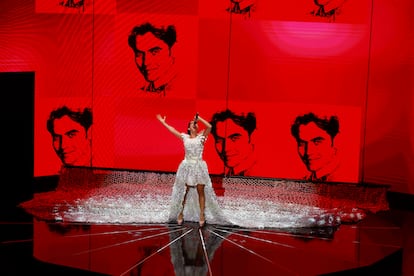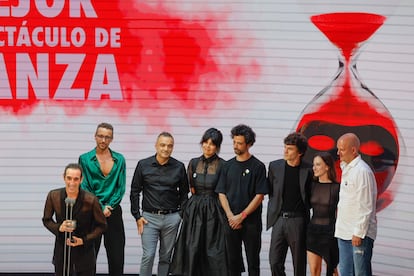It seemed tradition that the Max Awards, the most prestigious of the performing arts in Spain, organized by the General Society of Authors and Editors (SGAE), were distributed equally among the nominees. It was necessary to return until 2016 to find a gala where a single show received more than three awards, when Pinoxxio He achieved 7. This year, at the Gayarre Theater in Pamplona, where on Monday night the awards ceremony was held for the first time, the custom broke. And the dance did. Stubbythe blockbuster of the National Ballet of Spain, with the direction of Marcos Morau, the most international and quoted choreographer in the country, triumphed with five awards. He already arrived as the most nominated show with eight candidates, three more than Natural order of thingsanother dance assembly, which took three.
The night began with the award he received Stubby To better musical composition for scenic show. Later he took better costume design; Best lighting design; El Gordo in his discipline, the best dance show, and finally the best stage direction for Morau, absent from the gala.
The other great protagonist of the night was Natural order of thingS, spectacle of Guy Nader and María Campos, who won three awards, although the night missed the presence of its protagonists, touring the show for the country. The awards for Best Male and Female Dance Interpreter, for Alfonso Aguilar and María Campos, respectively, and best choreography for Guy Nader and María Campos were taken. From them some of the most applauded words of the night came out. Aguilar dedicated his prize to Maximiliano Corrales, a Mexican dancer and choreographer who died killed in his country in 2023. Nader, on the other hand, also in the voice of a representative, claimed his trade, that of dance, “the younger sister of the performing arts, the least space has and the one that has to fight for a decent budget.” “We need more than applause,” wrote the choreographer.
Then the gala fell into a long monotonous bump, between the delivery of awards of less relevance and performances of dance, circus and theater. The ceremony had begun with Aurora Beltrán on the guitar and the voice interpreting Tomorrowthe left Tahures song. He also danced the theater factory with the voices of the Saudoe choir of Pamplona, or Iruñeco Dantzariak, Basque dances, and a group of actors reciting texts by Spanish authors: from Lorca to Juan Mayorga, passing through Quevedo or María Folguera.
But almost two hours had to happen to get the most exciting moment of the night. Actress Petra Martínez took the stage to receive the Honor Prize that the SGAE gave her her partner, Juan Margallo, who died in April of this year, a few weeks after knowing that they would be awarded. Emblems of Spanish Independent Theater, it is difficult to talk about both of them without joining their names. So much that in 2022, as now, the two together won the National Theater Award. They are also the longest and most dear couple of the Spanish stages. And the Gayarre was responsible for proven. Martínez received a double, very long applause, from an standing auditorium, that the actress had to stop to start talking. “It’s hard for me because I have a loose tear. When we received the news that this award would give us this award and I were happy. I don’t like the awards very much, but this is beautiful. They give it to us for 60 years of work,” he said. Then he remembered his story, that of the Tábano group, that of the end of the transition, that of the Spanish theater that starred for so many years with his partner of life and work. “Juan and I have fun a lot, the theater for us has been fun,” he continued. The public released the tears she held out when she remembered Margallo: “We have been happy, happy, and I have died. At that moment it makes you angry and you shit in everything shitable. It is a whore to die, but worse it is to stay alive when someone dies so dear.” And ended with a cry: “Long live Palestine free!”

The theater shift came in the second part of the gala. Casting Learthe theatrical experiment designed and headed by Andréa Jiménez, in which every night a different actor took the stage without knowing what he was going to say or doing, won the best theater show and best adaptation of theatrical work or choreography, for Jiménez’s text with the collaboration of Juan Mayorga. A live scenic creation exercise in which a different actor every night goes up to the tables to compose live, without knowing anything previously and with the help of a pinganillo, the character of King Lear, accompanied by Jiménes herself. “Thanks to the 35 actors who have ventured to launch into me,” said the director.
Ágata Roca won the best actress award for her work in The categorical imperative and enriq auquer the best actor for his role in Watus DayI, his first leading role in theater. “This goes for all the people who were on the margin in that cursed transition in this country,” said the actor. He won Juan Vinuesa, the favorite (Talía and Godot took), who embodied Francisco Franco in 1936the work of long breath that recreates on stage some of the events of the Civil War. The spectacle of the National Dramatic Center had won six awards in the Talaía and five in the Godot, the best theater show included in both. Here, perhaps the product of a clear intention to decentralize the awards, he reached the gala with only two nominations: that of Vinuesa and another for the playwrights. He went blank. Theatrical authorship was taken by Itziar Pascual, by Pepitoso for the first time this award falls to a work directed for family audiences. “Maybe the theater does not serve to change things, but maybe yes but send a message of support, care, respect and love of childhoods,” said Pascual.
There were not many exciting speeches. Almost all of protocol thanks with constant but warm mentions of the conflict in Gaza. The most felt, perhaps, that of the protagonists of Anti-anbest musical or lyric show: “We want to celebrate the end of any abuse of power of any nature, the end of the genocide in Gaza,” they said, then sing a small fragment of their show: “The word went to war and managed to stop it, that’s why I have come to Farra and this I want to celebrate.” The president of De la SGAE, Antonio Onetti and that of the SGAE Foundation, Juan José Solana, who gave the usual institutional discourse of galas like this. But they did it with a piano – the two have been trying for years to turn such a bureaucratic moment – while Onetti claimed the work of the artists against artificial intelligence, walking between the seats. “The AI works without a soul, without imagination and without permission. Because this is the theft of the century! Luckily this year AI will not be able to compete with the natural talent of President Solana,” said the president.
The two -hour gala ended strange, in a tone completely opposite to that of the ceremony: with the electronic music of Castazabal and the fleeting movements of the camera operators. Disc Good preamble, yes, for the party that came later.
All winners
Best Theater Show
Casting Lear (Pirate Baro, Andrea Jiménez and Theater of Abbey).
Best dance show
Stubby (National Ballet of Spain).
Best musical or lyric show
Anti-an (Cía. Lucas Escobedo and National Company of Classical Theater – INAEM).
Best street show
FLED (Kammalca).
Best show for children’s, youth or family audience
Christmas story (encapsulando a Dickens).
Best revelation show
Against Ana (The opposite).
Best theatrical authorship
Itziar Pascual, by Pepito
Best authorship revelation
Ester Guntín, by He wanted black.
Best adaptation or version of theater or choreographic
Andrea Jiménez and Juan Mayorga, by Casting Lear.
Best musical composition for scenic show
Juan Cristóbal Saavedra, Enrique Bermúdez, Jonathan Bermúdez, Gabriel Georgio González and Roberto Vozmediano, by AFFORM.
Best choreography
Guy Nader and María Campos, for Natural order of things.
Better production work
The Fam Teatre, by Ambulant.
Best stage address
Marcos Morauu, for AFFORM.
Best scenic space design and video
Víctor Peralta, by Whena.
Best costume design
Silvia Delagneau, for AFFORM.
Best lighting design
Bernat Jansà, fear Stubby.
Best Actress
Ágata Roca, by The categorical imperative.
Best Actor
Enric Auquer, fear Watusi’s day.
Best Female Dance Interpreter
María Campos, by Natural order of things.
Best male dance interpreter
Alfonso Aguilar, by Natural order of things.
Amateur or social max
Ignacio Arangureny Vicente Galbete for his career as teachers of the School Theater Workshop at the Navarro Villoslada Institute of Pamplona.
Max applause from the public
The joy that happens, Last Creation of the Catalan Compañía Dagoll Dagom

